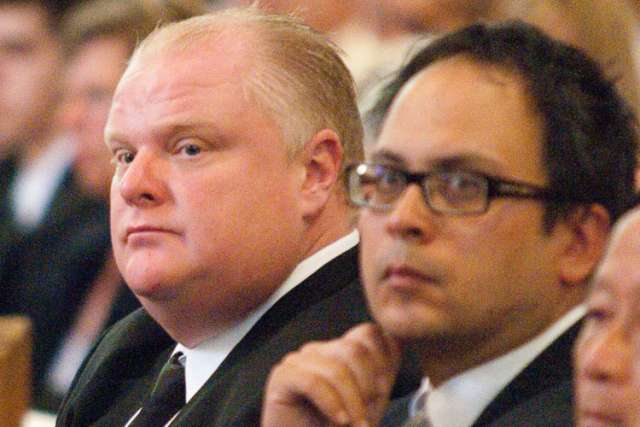With Ford still in Humber River Hospital and the future of his campaign in doubt, his two major rivals for the city’s top political post faced questions from Christian, Muslim, Jewish and other clergy about poverty, public housing, taxes and barriers faced by new immigrants and visible minorities. The Sept. 11 breakfast forum was organized by the Toronto Area Interfaith Council.
Chow praised faith communities for helping to defeat a proposal to place a major casino at the exhibition grounds in 2012. Tory praised synagogues, churches and mosques for their 25-year commitment to Out of the Cold programs that feed and shelter the homeless on winter nights.
Both Tory and Chow claimed they favoured a closer working relationship between faith communities and the city.
“First, we need to know what kinds of services you are offering,” said Chow. “We don’t know. We have some idea, but we need a full list.”
Chow said she would assign city staff to compile an inventory of Church-run services and resources from time to time.
Tory said he wanted faith communities engaged in discussions about the major challenges facing the city, along with business people and other organizations.
“You put a banker next to an anti-poverty activist and you say ‘Let’s talk about homelessness,’” he said.
Government’s job is to lead and co-ordinate, but it can’t do everything on its own, Tory said.
The breakfast forum was an opportunity to put the concerns of faith communities for the poor, the marginalized, the homeless and newcomers on the election agenda, said Toronto Area Interfaith Council organizer Fr. Damian MacPherson.
“It seems to me we’re not very much on their radar screen,” said the Franciscan Friar of the Atonement who co-ordinates ecumenical and interfaith affairs for the Archdiocese of Toronto.
“The city doesn’t know what faith communities are doing. Olivia Chow mentioned that we need an inventory of what (faith communities) are doing. Thinking of my own faith community, we have more than 35 organizations that serve in the public and the city has no idea we make that kind of contribution,” MacPherson said.
The candidates parted ways when asked where they would find the money to fund transit and new social housing projects. Chow spoke of property tax increases that approximately mirror the rate of inflation, which she put at three per cent. She also claimed a one per cent increase in the land transfer tax would raise $20 million.
Tory asked Chow how she could justify raising property taxes if it means the elderly and people on fixed incomes may lose their homes.
“The city can’t do it alone,” Tory said.
He advocated partnership with the province, federal government and the private sector to fill the funding gaps.
City councillor and organizer of the annual Faith in the City conferences Joe Mihevc said the breakfast meeting for candidates was mainly useful for forcing candidates to think about the role churches play in the city.
“It causes mayoralty candidates to think through how they’re going to deal with the faith communities after, if and when, they become mayor,” Mihevc said. “The last four years, certainly at the mayor’s level, nothing has happened. If we want to have a great city, we have the different building blocks — we have vibrant communities of every religious tradition. We need not just religious leadership but also political leadership to bring that energy and passion in terms of social justice together. The mayor has to be part of that.”
A good mayor would make demands of the faith communities, said the councillor.
“A mayor should demand, encourage, inspire faith communities basically to be that engine of hope,” he said. “That’s the first and foremost thing — to put out a vision of social harmony that includes the poor and the marginalized. Very often, faith communities are tempted to stay insular and worry about their congregations and not focus on the common good, the common wealth.”
Mihevc believes faith communities would welcome the challenge.
“That is not a violation of the separation of Church and state. That is asking communities to be what they are meant to be,” he said.

